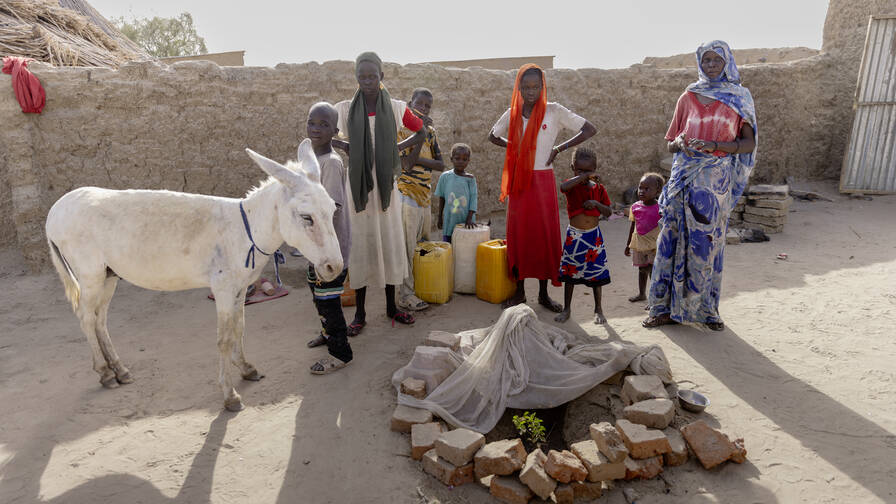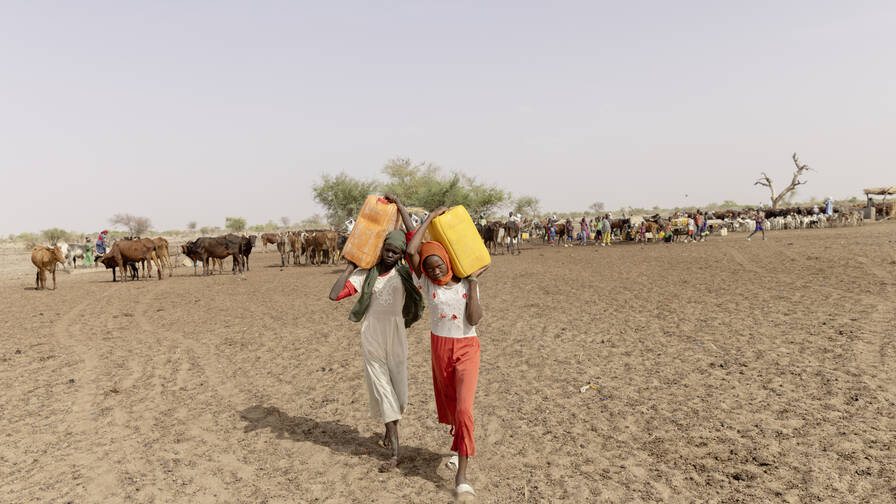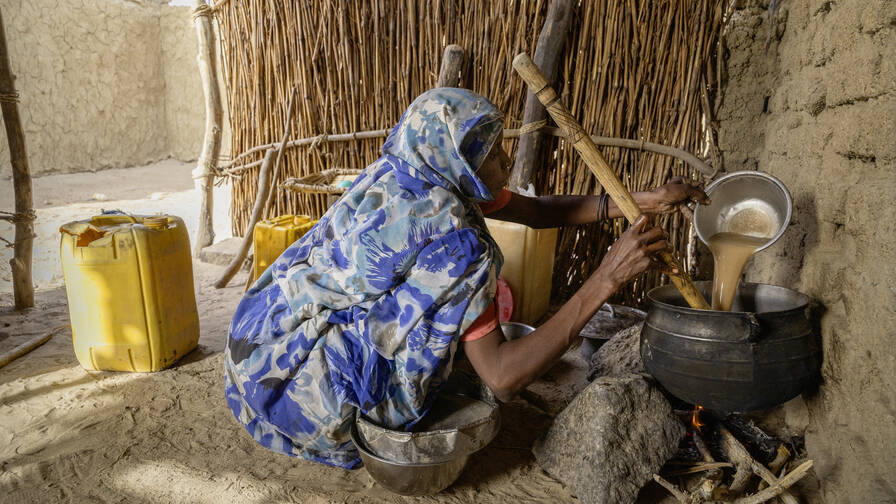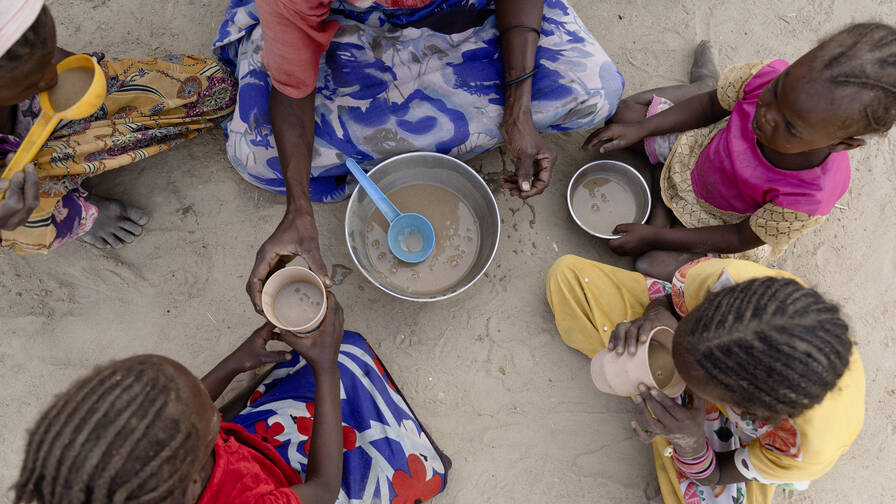


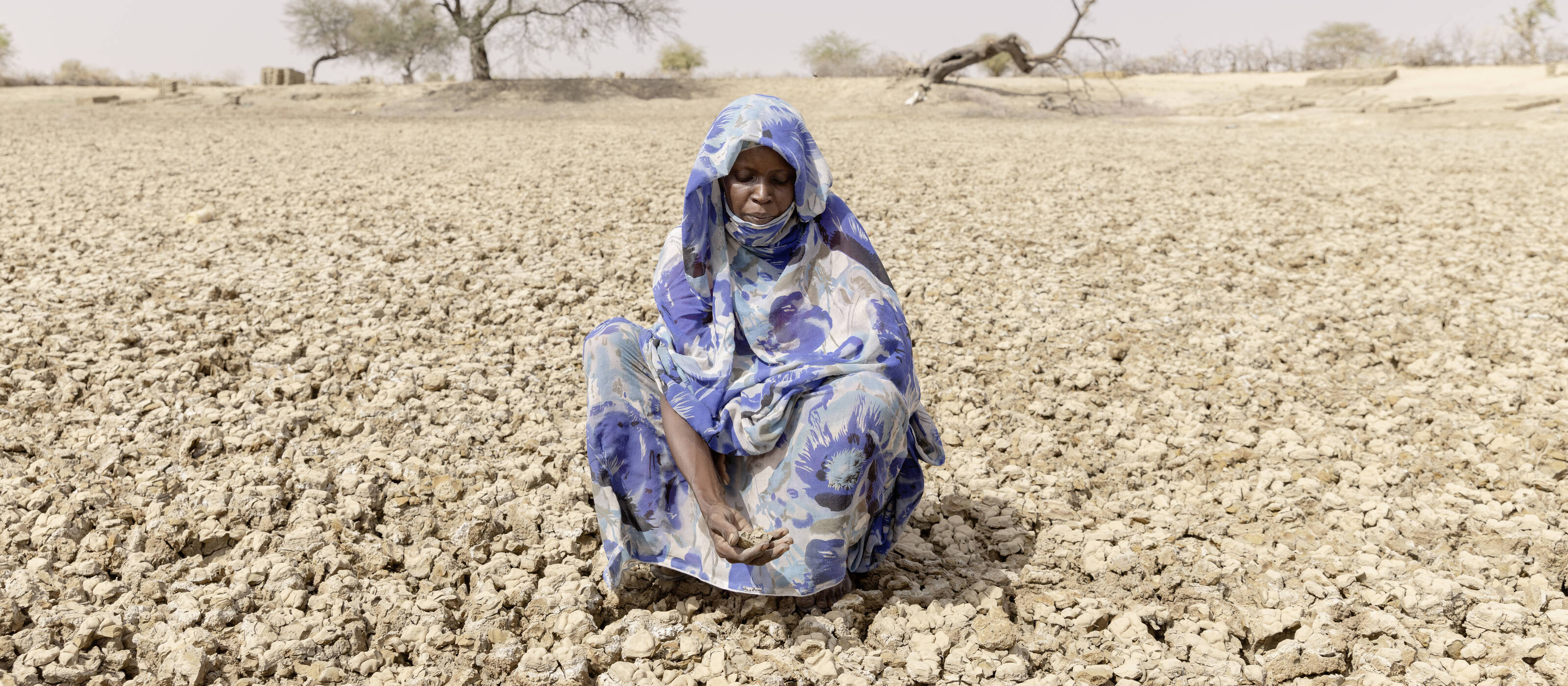

Hilfe für die Betroffenen der anhaltenden Hungerkrise
Ihre Spende gegen die Hungerkrise in der Sahelzone
Mehr als 35 Millionen Menschen sind im Tschad und weiteren Ländern der Sahelzone von Hunger bedroht. Es fehlt den Menschen in dieser Region an allem. Viele Kinder sind unter- oder mangelernährt. Die Caritas hilft den Betroffenen, ihr Überleben zu sichern. Lassen Sie uns diese humanitäre Katastrophe zusammen abwenden – gemeinsam gegen die Hungerkrise.
Ernährungsnotstand im Tschad
Seit Jahren fällt in grossen Teilen des Tschad kaum noch Regen. In einem der ärmsten Länder der Welt trocknen die Böden aus. Aufgrund der anhaltenden Dürre wissen die Bauernfamilien nicht mehr, wie sie ihre Kinder ernähren sollen. Die Lage ist so dramatisch, dass neun Prozent der Kinder unter fünf Jahren mangelernährt sind.
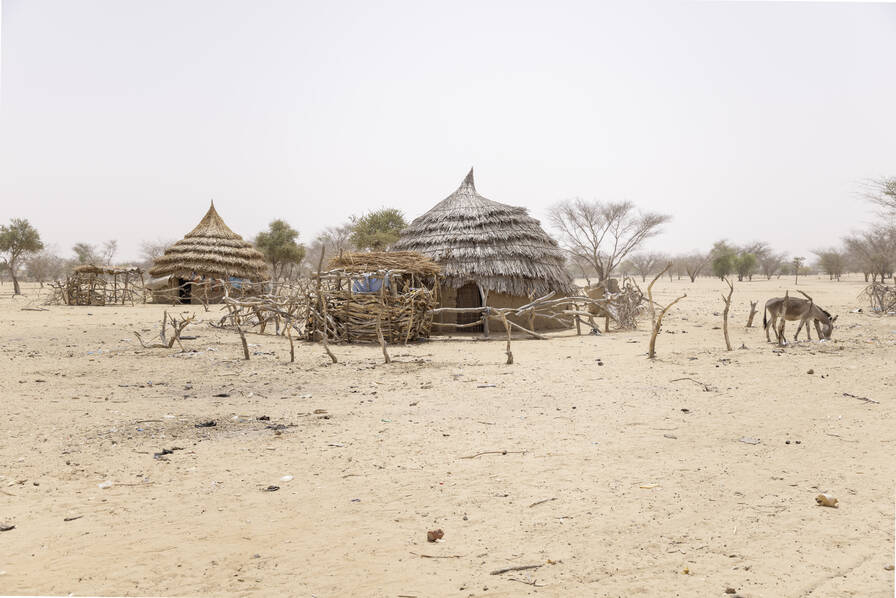
Die Provinz Batha, im Herzen des Tschad, ist eine der am stärksten von der Dürre betroffenen Regionen des Landes. Aufgrund des ausbleibenden Regens fielen die letzten Ernten äusserst mager aus. Es sind vor allem die Familien, die vom Klimawandel und der damit verbundenen Bedrohung ihrer Lebensgrundlagen betroffen sind.
Auch Mariam Abdraman Ali und ihre Familie gehören zu den Betroffenen
«Wir können uns nicht satt essen»
Seit Monaten leiden die Menschen in Mariams Dorf Dankala – wie die ganze Region Batha im Tschad – unter einer verheerenden Dürre und brütender Hitze. Aufgrund des ausbleibenden Regens fielen die letzten Ernten katastrophal aus.
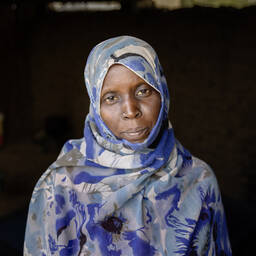
«Dieses Jahr hat es zu wenig geregnet, und wir konnten kaum etwas ernten.»Mariam Abdraman Ali (33)Mutter von sechs kindern
Mariam Abdraman Ali (33) kann ihre sechs Kinder nur zweimal am Tag mit Essen versorgen, und die Mahlzeiten bestehen meist aus Brei. «Wir können uns nicht satt essen, und die Kinder sind oft krank. Sie leiden unter Durchfall und Hautausschlägen», so Mariam Abdraman Ali. Die Kinder sind unterernährt. Das Gesundheitszentrum in der Region ist nicht in der Lage, sie angemessen zu behandeln.
Wir dürfen nicht tatenlos zuschauen, wie die Lage immer schlimmer wird
Die Caritas steht den betroffenen Menschen im Tschad, aber auch in anderen Ländern der Sahelzone, helfend zu Seite. Um gegen die Hungerkrise anzukämpfen, braucht es vereinte Kräfte. Dürfen wir auf Ihre Mithilfe zählen? Herzlichen Dank für Ihre Unterstützung.
Das Problem mit dem Trinkwasser
Für Mariam Abdraman Ali und die übrigen Bewohner von Dankala ist die Trinkwasserversorgung ein riesiges Problem. Das Wasser aus dem Dorfbrunnen ist salzig und daher nicht trinkbar. Um das Dorf mit sauberem Wasser zu versorgen, müsste man bis zu 100 Meter tief graben, und das ist viel zu teuer. Meist machen sich die Kinder frühmorgens zu Fuss auf den Weg, um aus dem Brunnen im fünf Kilometer entfernten Nachbardorf sauberes Wasser zu holen. Dieses Wasser ist jedoch nicht gratis. Ein 20-Liter-Kanister kostet 100 CFA-Francs (rund 15 Rappen).
Auch das Vieh leidet. Die Dürre hat das Weideland vertrocknen lassen, und viele Tiere sind gestorben. Ausserdem hatten die Frauen im Dorf einen Gemüsegarten angelegt, in dem sie Karotten, Petersilie, Rüben, Auberginen, Tomaten, Kohl, Okra und Bohnen anbauten. Doch auch die Entwicklung des Gartens hat unter dem Wassermangel gelitten. Die Frauen mussten immer wieder von vorne beginnen.
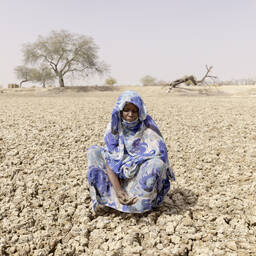
«Unsere Zukunft ist ungewiss. Dieses Jahr haben wir viele Probleme, vor allem was den Zugang zu Lebensmitteln anbelangt. Und das Wasser in unserem Dorf ist zu salzig, um es zu trinken. Trinkwasser müssen wir zu Fuss aus dem fünf Kilometer entfernten Nachbardorf holen.»Mariam Abdraman Ali (33)
Nothilfe der Caritas
Caritas hilft den betroffenen Menschen in Batha. Sie leistet humanitäre Soforthilfe und hat dabei stets auch die langfristige Perspektive im Blick. In der Zeit des Nahrungsmittelengpasses von Juni bis September ist die Ernährungssituation besonders prekär. Caritas unterstützt daher die am stärksten Betroffenen – meist Familien mit alleinerziehenden Müttern – mit Bargeldhilfen. Aber auch die Spende von Ziegen und Unterstützung beim Anlegen von Gemüsegärten sind eine grosse Hilfe.
Hunger sofort bekämpfen
Der von Juni bis September dauernde Nahrungsmittelengpass ist die schwierigste Zeit, da die Ressourcen dann nahezu erschöpft sind. Folgende Hilfsmassnahmen zeigen eine sofortige Wirkung:
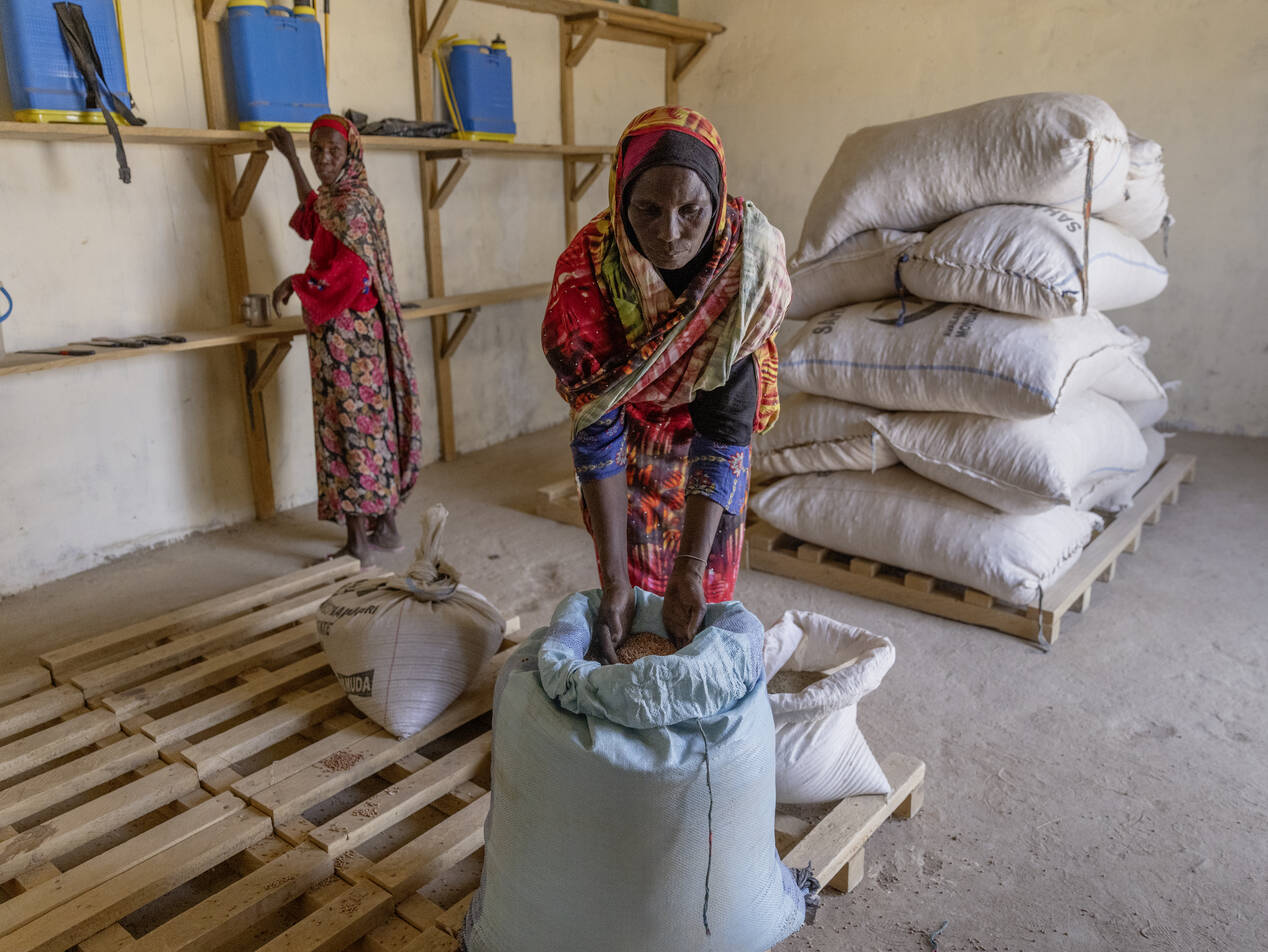
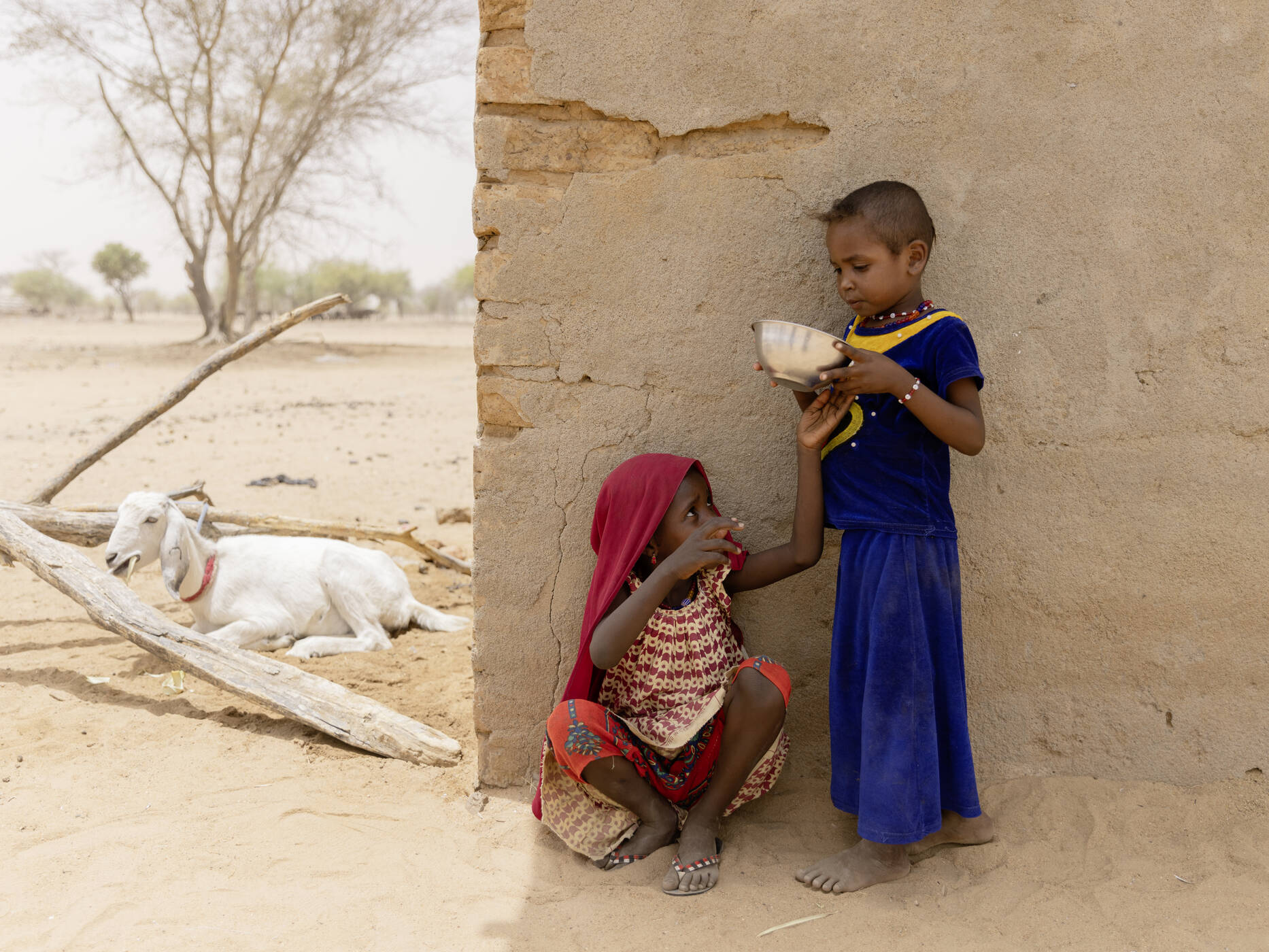
- Bargeldhilfen für die bedürftigsten Familien: So können sie Lebensmittel kaufen und die dringendsten Ausgaben decken.
- Schnelle Hilfe für unterernährte Kinder: Frauen lernen, wie man mithilfe lokaler Produkte reichhaltigere Mahlzeiten zubereitet.
- Getreidebanken: Bäuerinnen und Bauern erhalten in schwierigen Zeiten Zugang zu ihrer eigenen Produktion.
Ernährung langfristig sichern
Caritas achtet bei ihrer Nothilfe auch auf Nachhaltigkeit. Folgende Massnahmen zielen auf die langfristige Ernährungssicherheit ab:
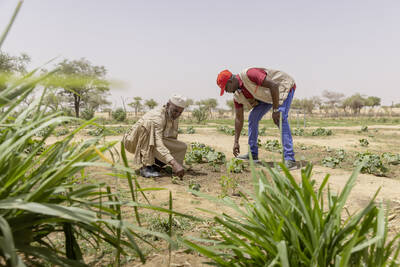
Schulung in nachhaltigen Anbaumethoden: Die Bauernfamilien erhalten das nötige Wissen, um ihre Felder trotz Dürre zu bestellen.
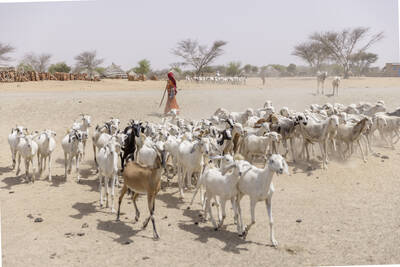
Abgabe von Ziegen: Die Frauen können so ihre Kinder mit Milch versorgen.
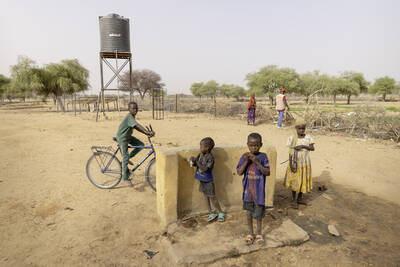
Trinkwasserbohrungen: Die Menschen erhalten Zugang zu sauberem Trinkwasser.
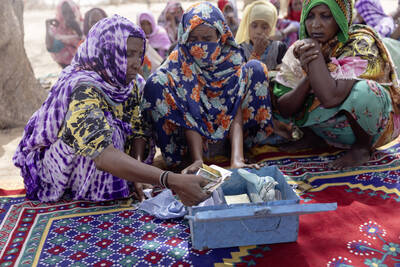
Bildung von Spargruppen: Mehrere Familien sparen gemeinsam Kapital an, aus dem sie Darlehen für Anschaffungen beziehen können.
Weitere Informationen
Gegen den HungerAuswahl aktueller Projekte im Tschad, in Mali und in Äthiopien
Titelbild: Die Dürre im Tschad fordert von den Menschen alles ab. Die Caritas leistet Nothilfe und langfristige Unterstützung. © Reto Albertalli
